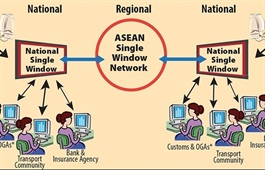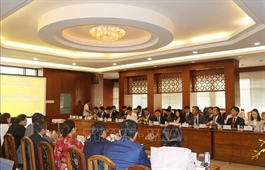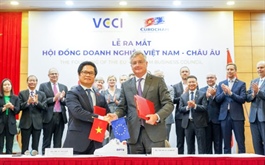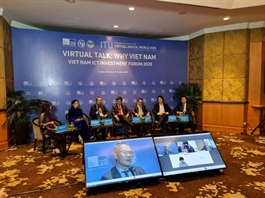Crafting a complete framework for online services
Crafting a complete framework for online services
Some articles of draft Decree No.72/2013/ND-CP regarding the management, provision and use of internet services and online information have come up against contrasting opinions, mostly from overseas companies providing related services in Vietnam. Talking to VIR’s Van Anh, managing director of the Asia Internet Coalition Jeff Paine clarified the problems that foreign suppliers may struggle with if the draft decree is approved.

Managing director of the Asia Internet Coalition Jeff Paine
|
The draft decree aims to resolve inadequacies in management and also assure the rights and benefits of related businesses, aiding them in getting involved in the online service market. Can the draft decree fulfill its targets?
The main concern with the draft decree is the impact that it will have on post-pandemic economic recovery efforts by the Vietnamese government. The pandemic has created a range of new issues for the digital industry which is directing all its efforts to provide effective communication, entertainment, logistics, telemedicine, and tele-education services.
At the same time, online service providers are building solutions in these areas to ensure there is no compromise to users’ security and privacy. The extreme nature of the requirements in the draft decree will certainly force some service providers to limit offerings to Vietnam, depriving consumers and businesses of critical options and dampening competition and innovation.
Vietnam has a booming internet economy. According to a 2019 research report by Google, Temasek, and Bain & Company, Vietnam’s digital economy reached $12 billion in 2019 on a 38 per cent annualised growth rate since 2015. With the gross merchandise value of its internet economy set to account for over 5 per cent of the country’s GDP in 2019, Vietnam is emerging as the most digital of all economies in Southeast Asia.
The draft decree, which contains provisions that will impact regional and local players alike, could unintentionally impair the growth of Vietnam’s e-commerce market, at a time when countries are depending on the digital economy to drive post-pandemic economic recovery.
Based on a document the Asia Internet Coalition (AIC) sent to the Ministry of Information and Communications, the requirements of the draft Decree 72 are very strict and will affect some service providers. Which areas will cause the largest difficulties for companies?
The draft Decree 72’s proposed content controls raises serious data privacy and governance concerns, while proposals to license online platforms create new barriers to entry that could harm smaller enterprises and startups that are leveraging these to power Vietnam’s digital economy. Local data storage requirements also ignore the importance of free cross border data flow to global economies, likely increasing cost and complexity for businesses and reducing Vietnam’s attractiveness.
Article 22 of Clause 5 stipulates processes for content takedown requests, with a specific turnaround time. Under the proposed amendments, the public information provider is required to identify the violating information and take appropriate action within 24 hours. Generally, the regulation should not attempt to compel foreign companies to take down customer content hosted on their systems where such content is hosted on equipment outside of Vietnam (and maybe lawful content in the country in which it is hosted).
Requests to remove unlawful content and law enforcement requests in relation to content should be directed to the entity responsible for publishing it, not the hosting intermediary.
Importantly, 24 hours for the first notice is an insufficient amount of time for content to be reviewed. Specific turnarounds such as 24 hours are neither reasonable nor consider the realities of business models and abilities to remove content or the complexities of the process. This causes undue operational burdens to providers.
Opinions are still being collected on the decree. What related recommendations do you propose to make it more complete and favour online service suppliers in general?
The AIC believes that the internet has an immensely positive impact on society. We support the development of a transparent legal framework that would promote the digital economy’s continued contribution to Vietnam’s growth. Such a framework must account for the sheer diversity of business models that contribute to the overall growth of e-commerce, the exponential speed of innovation in e-commerce solutions, and the industry’s present and potential benefits to Vietnam’s socioeconomic landscape.
The AIC believes that three key principles should guide the development of an effective regulatory framework with respect to the draft decree.
Firstly, it is important to clearly define what companies can do to fulfil their legal responsibilities, including content removal obligations. A lack of clarity in the definitions, procedures, and restrictions placed on companies will hinder efforts to implement and comply with regulations (for example due to misinterpretations of vague rules), and also cause an undue increase in the cost of doing business for local, as well as, international developers and service providers.
Secondly, a regulatory framework should have sufficient flexibility to accommodate new technology. While laws should accommodate relevant differences between platforms, given the fast-evolving nature of the ICT sector, laws should be written in technology-neutral ways that address the underlying issue rather than focusing on existing technologies or mandating specific technological fixes. Finally, laws should support companies’ to publish transparency reports about content removals and provide people with notice and an ability to appeal the removal of content. They should also recognise that fairness is a flexible and context-dependent notion.






















